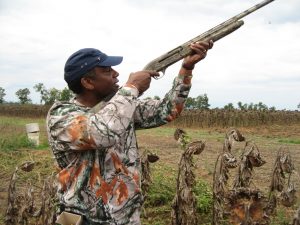The Kentucky Department for Public Health (DPH), within the Cabinet for Health and Family Services (CHFS), is reminding the public that households, businesses and communities can increase their preparedness by following this year’s theme of Prepared, Not Scared. Be Ready for Disasters during September – National Preparedness Month (NPM).
This nationwide effort is organized each year by the U.S. Department of Homeland Security to encourage citizens to prepare and plan for emergencies in their homes, business and schools. This yearly observance was founded after 9/11 to increase preparedness awareness in the U.S., a fitting time to join the effort to help communities prepare for emergencies, such as natural disasters and potential terrorist threats, and to encourage individuals to take action.
“Emergencies and disasters can happen anytime and anywhere, often without notice and can leave us scared and confused,” said Jim House, Preparedness Branch Manager at DPH. “By taking the time to follow the ten steps outlined below, we all can better prepare ourselves and our communities should emergencies or disasters strike. Remember that preparedness is a shared responsibility – it takes a whole community to prepare and respond to emergencies.”
The following ten steps of Prepared, Not Scared. Be Ready for Disasters can encourage households, businesses and organizations to prepare for emergencies during National Preparedness Month by taking the following actions:
- Assemble a Go Bag with supplies in case of an emergency.
- Prepare digital forms of important documents for an emergency.
- Have extra supplies in case of an emergency.
- Download the FEMA app (https://www.fema.gov/mobile-app) to provide emergency information at your fingertips.
- Have an alternative power source for devices during emergencies.
- Set up an In Case of Emergency (ICE) emergency contact in your cell phone.
- Choose an emergency contact when out-of-town.
- Find a local, pet-friendly evacuation center.
- Update your social media to tell loved ones you are safe during an emergency.
- Remember that in an emergency – text and don’t call. Phone lines will be backed up with calls reporting important information. To let your loved ones know you are safe, send them a text message instead.
For more information about preparing for and responding to emergencies, visit http://www.ready.gov.
 Mayor Greg Fischer joined Metro Council members, the Commission on Public Art, artist Todd C. Smith, and community partners at the base of the Big Four Bridge to unveil Bike Sense Louisville, a public art project that will promote healthy lifestyle habits and provide new data on the city’s air quality and temperature.
Mayor Greg Fischer joined Metro Council members, the Commission on Public Art, artist Todd C. Smith, and community partners at the base of the Big Four Bridge to unveil Bike Sense Louisville, a public art project that will promote healthy lifestyle habits and provide new data on the city’s air quality and temperature.
Using sensor units that fit into cyclists’ water bottle holders, data is collected about the cyclists’ speed and location, as well as the temperature and air quality outside. The data is then translated into sound that is streamed in both real-time on the Bike Sense website and broadcast over the Big Four Bridge speakers.
“Bike Sense encompasses our city’s core values of lifelong learning and health by incorporating science and exercise into public art,” said the Mayor. “This project will get people moving, either as volunteer cyclists collecting environmental data or as pedestrians crossing the Big Four Bridge to listen to the sounds created.”
The data will be publicly available and support the work of University of Louisville’s Christina Lee Brown Envirome Institute.
“The Center for Healthy Air Water and Soil and the Superfund Research Center in the UofL Christina Lee Brown Envirome Institute are partnering with the innovative Bike Sense project to raise awareness of the health risks posed by many volatile organic compounds,” said Dr. Ted Smith, Deputy Director of the Envirome Institute. “We look forward to providing technical assistance and health risk information to the project and its many cycling participants.”
The project was selected by the Commission on Public Art through a call for artists and is funded through a mix of private donations, public dollars, and an ArtsMatch grant from Fund for the Arts.
“By collecting volunteer cycling data that considers location as well as environmental factors, like temperature and air quality, we could learn a lot about where people are biking and how healthy it is to bike here. The sound part of the project was my creative way of sharing this data with the public,” said artist Todd C. Smith. “The bridge is a public space that sees thousands of pedestrians and cyclists and is the symbol of connection for the Kentuckiana region. I look forward to seeing how this year-long project progresses.”
For more information, visit BikeSense.net.
The Department of Public Health and Wellness will host a Birth Equity Town Hall Meeting on Thursday September 5 at 6 p.m. at 400 E. Gray St.
The meeting will consider policy initiatives to close the gap in infant and maternal mortality between the general population and minority communities. The meeting will seek input from community residents and will hear from local and national experts on best-practice policy solutions.
“Louisville has made progress in lowering overall infant mortality rates over the past twenty years,” said Public Health director and the city’s chief health strategist, Dr. Sarah Moyer. “However, there is still a significant gap between the rate at which white and black babies die before their first birthday. African American women are also still far more likely to die in childbirth. The Town Hall Meeting will seek solutions to bring about the day when every child and every community in or city thrives. I encourage people to attend.”
A panel at the Town Hall Meeting will be led by Dr. Edward Ehlinger, Acting Chair of the U.S. Health and Human Service’s Secretary’s Advisory Committee on Infant Mortality. Panelists will include Dr. Carol Brees of the University of Louisville; Dr. Brittany Watkins of Centerstone; Dr. Olugbemisola Obi of U of L Physicians; Dr. Kelly Pryor, a mother; Arthur Lemons, a Healthy Start father; Asia Ware, a Healthy Start mother and Emily Whitsett-Pickett of Mama to Mama. Dr. Moyer will also offer remarks.
While the overall infant mortality rate, the rate at which infants die before their first birthday, has fallen in Louisville from 7.6 to 6.1 per 1000 live births (five year averages of 1995 – 1999 and 2013 – 2017), African American babies still average 5.8 more deaths per 1000 live births than white babies. Also, according to the American Medical Association, African American women in the United States are two to six times more likely to die of complications from pregnancy than white women.

Canada geese in snow. Photos taken Feb. 9, 2006, at Kentucky Fish and Wildlife headquarters lake.
Applications will be accepted beginning Sept. 1 for two specially constructed waterfowl blinds for mobility-impaired hunters at Doug Travis Wildlife Management Area (WMA) in Hickman and Carlisle counties. Applications for these quota hunts must be postmarked by Sept. 30.
“One blind, Blind 19, is a boat-in site with a handicap-accessible boat ramp. Hunters must hunt within 10 yards of the location marker while using this blind. There will not be a constructed blind to hide the boat this year,” said Wes Little, migratory bird biologist for the Kentucky Department of Fish and Wildlife Resources. “The other blind, Blind 13, is an above ground blind that is wheelchair accessible. The mobility-impaired hunt party will be able to drive to this blind.”
The hunt dates for the mobility-impaired quota hunts during 2019-2020 are:
- Nov. 28–Dec 1, 2019
- Dec. 7-8, 2019
- Dec. 9–12, 2019
- Dec. 13–15, 2019
- Dec. 16–19, 2019
- Dec. 20–22, 2019
- Dec. 23–26, 2019
- Dec. 27–29, 2019
- Dec. 30, 2019 – Jan. 2, 2020
- Jan. 3–5, 2020
- Jan. 6–9, 2020
- Jan. 10–12, 2020
- Jan. 13–16, 2020
- Jan 17–19, 2020
- Jan. 20–23, 2020
- Jan. 24–26, 2020
- Jan. 31, 2020
To register to be drawn for this blind during one or more of the mobility-impaired hunts, mail a 3 x 5 white index card in an envelope addressed to:
Kentucky Department of Fish and Wildlife Resources
Attn: Wes Little – Doug Travis WMA Mobility-Impaired Waterfowl Hunt Application
1 Sportsman’s Lane
Frankfort, KY 40601
The envelope must be postmarked between Sept. 1 and Sept. 30.
“Hunters must specify on the index card the dates for which they are applying and list them in order of preference,” Little said. “While they may apply for up to three hunting dates, they can only be drawn for one hunt. The index card must include the hunter’s name, complete mailing address and phone number as well.”
Successful applicants may invite up to three guests. After Sept. 30, those selected for hunts will be mailed a quota hunt permit for the dates they are drawn, a map showing the blind location and other instructions concerning the hunt. Unsuccessful applicants will not be notified. Duplicate applications for the same hunt will result in disqualification.
“The hunting party will be responsible for bringing and placing decoys as well as retrieving birds,” Little said. “These blinds are open to standby hunters on a first-come, first-served basis if the blind is not occupied by the drawn party by one hour before sunrise, but priority for its use will go to mobility impaired hunters.”
If not completed already, waterfowl hunters must go online at the Kentucky Fish and Wildlife website at fw.ky.gov and click the “My Profile” tab to fill out the Harvest Information Program (HIP) survey before hunting.

Photo: Kentucky Department Fish And Wildlife
Dove season opens on its traditional day of Sept. 1, and dove hunters need to know about some new rules regarding the use of public dove fields before hunting this year.
“New for this year, there is no access to public dove fields from Aug. 15 to Sept.1,” said Wes Little, migratory bird biologist for the Kentucky Department of Fish and Wildlife Resources. “People can scout from the parking lot or road, but you cannot physically walk into the field.”
Little explained hunters repeatedly scouting fields before the season disturbs the doves and makes them more prone to stop using the field.
“The week prior to the season, we see many groups of hunters scouting the fields, and they unintentionally flush birds,” he said. “The more times you flush a dove, the less likely it is to come back to that field. We want to lessen some of that pressure before the season to ensure a quality hunt.”
There are two new public dove fields this year in Ballard and Butler counties. Hunters using the public dove fields at Curtis Gates Lloyd Wildlife Management Area (WMA) in Grant County must know the shooting hours on opening day (Sept. 1) begin at 2 p.m.
Hunters using the cooperator dove field in Madison County off KY 627 must use U.S. Fish and Wildlife Service approved non-toxic shot.
Little noted that a few of the fields slated for public access failed due to the amount of rain this past spring.
A list of current dove fields is available by consulting the 2019-2020 Kentucky Hunting Guide for Dove, Early Waterfowl, Woodcock, Snipe and Crow. The guide, which is available online only, is accessible on Kentucky Fish and Wildlife’s website. Go to fw.ky.gov and search under the keyword, “dove,” for rules, regulations and additional information.
Hunters can also use the interactive dove field map to find public dove fields on the Kentucky Fish and Wildlife website by searching under the keywords, “Public Dove Fields.”
Hunters using public fields should remember that they cannot clean their birds at the site. Hunters also must pick up all spent shotshell hulls or other trash and obey all signs.
The first segment of the 2019-2020 dove season opens Sept. 1 and closes Oct. 26. The second segment opens Nov. 28 and closes Dec. 8, while the third segment of dove season opens Dec. 21, 2019 and closes Jan. 12, 2020.
In addition to a valid Kentucky hunting license, dove hunters must possess a Kentucky Migratory Game Bird/Waterfowl Hunting Permit. Shotguns must be plugged to only hold three shells total, one in the chamber and two in the magazine.
If not completed already, dove hunters must go online at the Kentucky Fish and Wildlife website at fw.ky.gov and click the “My Profile” tab to fill out the Harvest Information Program (HIP) survey before hunting.
Mayor Greg Fischer recently announced that Chewy.com, the leading online pet retailer, is planning to grow in Louisville less than a year after opening a customer service center here.
“We couldn’t be more ecstatic that Chewy.com is bringing additional jobs and investment to our city by expanding for the second time in less than a year,” said Mayor Greg Fischer. “Through the UPS Worldport, Louisville offers companies like Chewy.com the ability to quickly get customers what they need, while enjoying Louisville’s robust business environment. We wish Chewy.com continued success.”
The Kentucky Economic Development Finance Authority Thursday preliminarily approved $1 million in tax incentives for Chewy.com. The company will bring 150 jobs and invest $4.5 million to expand into office space at 11403 Bluegrass Parkway.
This new investment by Chewy is in addition to the $7.2 million already invested and 300 jobs at its more than 88,000-square-foot Pharmacy Customer Service Center, 3621 Fern Valley Road.
Louisville Forward staff continues to work with Chewy.com to connect them with business services, guiding them through the city’s permitting process, and identifying potential community partnerships.
“Chewy’s expansion in Louisville responds to the growing demand we’ve seen from our loyal customers. It allows us to continue delivering the high-touch, reliable service our customers know and love,” said Mita Malhotra, Vice President of Chewy Healthcare. “We continue to enhance our services to support our veterinarian partners and share a commitment to improving pet health and happiness.”
Chewy.com is an e-commerce business that caters to pet owners and pet lovers. It is a one-stop shop, offering more than 1,600 brands of everything from toys and treats to pet medications and supplies. The company was purchased in 2017 by PetSmart in the largest-ever e-commerce transaction. Chewy.com employs roughly 11,000 people in the United States.
 Attorney General Andy Beshear said his office has completed a review of publicly available data and determined that the governor’s Labor Cabinet may have failed to secure a single bond for any mining company operating in the state. Beshear’s review indicates that as many as 30 mining companies should have bonds on file, without which nearly 1,000 mining employees are at risk.
Attorney General Andy Beshear said his office has completed a review of publicly available data and determined that the governor’s Labor Cabinet may have failed to secure a single bond for any mining company operating in the state. Beshear’s review indicates that as many as 30 mining companies should have bonds on file, without which nearly 1,000 mining employees are at risk.
In a five-page report, Beshear said the Labor Cabinet has not only failed to enforce a state law that aims to protect four weeks of employee pay if their company shuts down, they actively tried to repeal it. The law (KRS 337.200) applies to certain businesses, including mining companies who have done business in the state for fewer than five consecutive years.
Beshear began his review following media reports that the cabinet failed to require the now bankrupt Blackjewel in Harlan County to post a bond. After the mine closed July 1, miners’ paychecks bounced and they have not since been paid. Beshear wanted to find out if other miners face the same risk.
“In response to Blackjewel’s closing, the Labor Cabinet claimed ‘there is no mechanism in law for them to figure out when a new company has opened in the state that is supposed to post a bond,’ but my office was able to determine this with publicly available information within a few days,” Beshear said. “The Labor Cabinet has an absolute duty to enforce the law and has utterly failed to do so. They must begin enforcing these bonds to assure no one ever goes through what the Blackjewel miners are going through.”
Beshear’s review included visiting the Energy and Environment Cabinet’s (EEC) website to study a publicly available list of mining licenses and the Secretary of State’s website to view each licensee’s business filing. Beshear’s office then compiled a list of licensed mining companies the EEC has authorized to operate in the state, and which have been doing so for fewer than five consecutive years.
Monday, Aug. 26, after a delay, Beshear received a response to his open records request for a copy of any bonds on file at the Labor Cabinet. Beshear’s office quickly concluded that the cabinet failed to secure any of the required bonds from mining companies.
The office also used the EEC Division of Mine Safety 2018 Annual Report to determine how many miners may be working at the mines operated by the licensees who should have been on file with the cabinet.
Beshear’s letter says the cabinet had various accessible ways to track and enforce the law, including working with other agencies and utilizing the cabinet’s claim to broad subpoena powers to investigate labor law violations.
Instead of enforcing the law, however, the Labor Cabinet took time to unsuccessfully attempt to repeal it, Beshear said.
At the March 1, 2018, meeting of the House Standing Committee on Economic Development and Workforce Investment cabinet officials testified in support of repealing the bond requirements. The bill passed committee, but did not receive a vote on the floor of the Kentucky House of Representatives.
“While the Labor Cabinet may prefer that these laws be repealed, it has a duty to enforce them while they remain on the books,” Beshear said. “The cabinet should use the many public resources we have identified to do so.”
Since Beshear learned of the troubling complaints surrounding the closing of the Blackjewel mine, he has taken action. Beshear previously instructed his office to use all of its powers and resources to seek answers for those who have been harmed.
Beshear has dedicated an investigator to look into complaints of clawed-back paychecks and concerns related to child support deductions and has reached out to local county attorneys on these same child support issues. Devoted mediators from Beshear’s office are available to help employees mitigate debts owed to individuals or businesses as a result of bounced paychecks.
Beshear also joined with Virginia Attorney General Mark Herring to ask for the immediate payment of all wages owed to Blackjewel employees. In their joint request to the Office of the United States Trustee July 16, the attorneys general cite the serious and ongoing financial harm experienced by miners in Kentucky and Virginia following Blackjewel’s haphazard bankruptcy.
Beshear asks anyone with complaints or information related to Blackjewel’s bankruptcy to contact his office at 502-696-5300 and ask to speak with Jan Velez. Beshear’s office will track and route each caller to the appropriate contact.
 Weather
Weather Traffic
Traffic @LouisvilleDispatch
@LouisvilleDispatch @LouisvilleDisp
@LouisvilleDisp Subscribe
Subscribe
